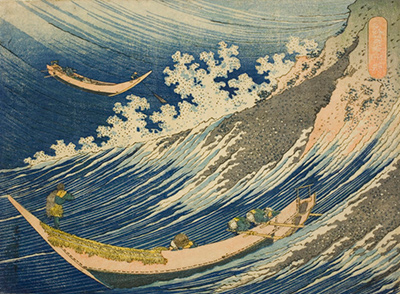Hokusai
Choshi in Shimosa by Hokusai
Choshi in Shimosa is a work on ink and paper by Hokusai, and it depicts one of the artist’s favourite themes: the ocean. Hokusai was born in Edo (which we now know as Tokyo) in 1760, and he died in the same region in 1849.
During his lifetime he built up a reputation as one of the greatest artists that Japan has ever known – a reputation that retains its force today. Hokusai’s most famous work of art is without doubt The Great Wave (if we consider his fame in an international context), however even this work was part of a larger series (entitled ‘Thirty Six Views of My Fuji’) and this underscores the importance of taking into account the whole of Hokusai’s opus.
Choshi in Shimosa is part of a series of works of art, too. This series is called ‘One Thousand Views of the Ocean’. Hokusai loved to depict natural forms with rich colours and amazing detail, and Choshi in Shimosa is a great example of this. From the fronds of the trees in the background to the sumptuous fabrics of the garments worn by the human figure in the foreground, this is a painting that rewards a long look. Wherever the viewer’s eye rests in this painting, they will find forms that are executed with precision and high levels of skill, as well as a great blend of imagination and attention to detail.
Choshi in Shimosa was completed in 1833, around the same time as Hokusai painted The Great Wave. Woodblock and ink were Hokusai’s media of choice when it came to making artworks, and he was a key pioneer of the particular woodblock style of painting known as Ukiyo-e. Choshi in Shimosa is not a huge painting like Picasso’s Guernica. In Japanese measurements of the time, it is a horizontal (‘yoko’e’) chuban which means it measures in at 19.5 cm by 26.5 cm and which is half of the larger ‘oban’ style of paper of canvas. Nevertheless, this is a work of at that commands the viewer’s attention.
